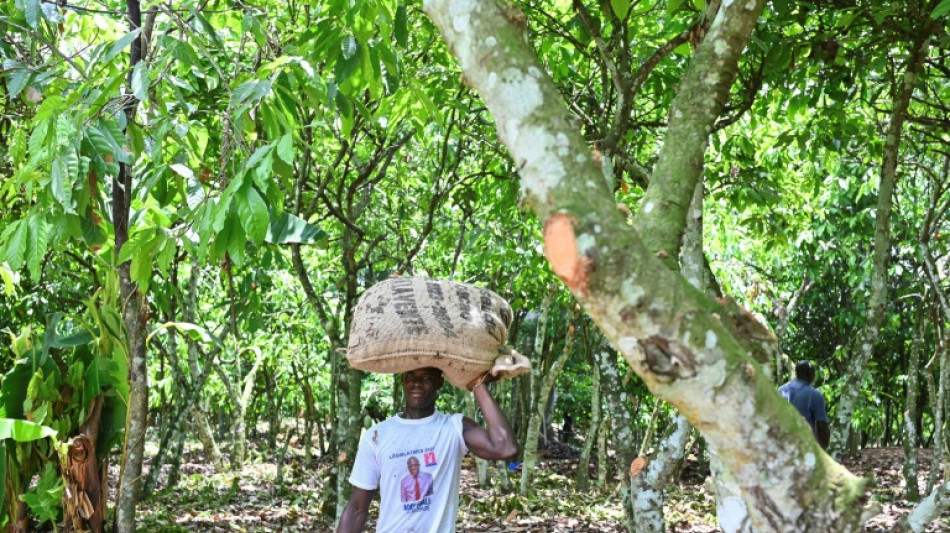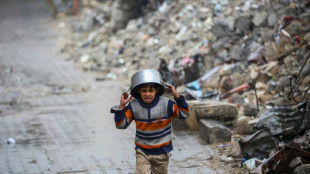
-
 Stocks retreat, dollar mixed on Trump tariff warning
Stocks retreat, dollar mixed on Trump tariff warning
-
No regrets: Merkel looks back at refugee crisis, Russia ties

-
 IPL history-maker, 13, who 'came on Earth to play cricket'
IPL history-maker, 13, who 'came on Earth to play cricket'
-
Ukraine says Russia using landmines to carry out 'genocidal activities'

-
 Prosecutors seek up to 12-year terms for French rape trial defendants
Prosecutors seek up to 12-year terms for French rape trial defendants
-
'Record' drone barrage pummels Ukraine as missile tensions seethe

-
 Laos hostel staff detained after backpackers' deaths
Laos hostel staff detained after backpackers' deaths
-
Hong Kong LGBTQ advocate wins posthumous legal victory

-
 Ukraine says cannot meet landmine destruction pledge due to Russia invasion
Ukraine says cannot meet landmine destruction pledge due to Russia invasion
-
Rod Stewart to play Glastonbury legends slot

-
 Winter rains pile misery on war-torn Gaza's displaced
Winter rains pile misery on war-torn Gaza's displaced
-
'Taiwan also has baseball': jubilant fans celebrate historic win

-
 Russia pummels Ukraine with 'record' drone barrage
Russia pummels Ukraine with 'record' drone barrage
-
Paul Pogba blackmail trial set to open in Paris

-
 China's Huawei unveils 'milestone' smartphone with homegrown OS
China's Huawei unveils 'milestone' smartphone with homegrown OS
-
Landmine victims gather to protest US decision to supply Ukraine

-
 Indian rival royal factions clash outside palace
Indian rival royal factions clash outside palace
-
Equity markets retreat, dollar gains as Trump fires tariff warning

-
 Manga adaptation 'Drops of God' nets International Emmy Award
Manga adaptation 'Drops of God' nets International Emmy Award
-
China's Huawei launches 'milestone' smartphone with homegrown OS

-
 Philippine VP denies assassination plot against Marcos
Philippine VP denies assassination plot against Marcos
-
Four Pakistan security forces killed as ex-PM Khan supporters flood capital

-
 Hong Kong's legal battles over LGBTQ rights: key dates
Hong Kong's legal battles over LGBTQ rights: key dates
-
US lawmakers warn Hong Kong becoming financial crime hub

-
 Compressed natural gas vehicles gain slow momentum in Nigeria
Compressed natural gas vehicles gain slow momentum in Nigeria
-
As Arctic climate warms, even Santa runs short of snow

-
 Plastic pollution talks: the key sticking points
Plastic pollution talks: the key sticking points
-
Indonesia rejects Apple's $100 million investment offer

-
 Pakistan police fire tear gas, rubber bullets at ex-PM Khan supporters
Pakistan police fire tear gas, rubber bullets at ex-PM Khan supporters
-
Ronaldo double takes Al Nassr to brink of AFC Champions League last 16

-
 Pakistan police fire tear gas, rubber bullets at pro-Khan supporters
Pakistan police fire tear gas, rubber bullets at pro-Khan supporters
-
Hong Kong same-sex couples win housing, inheritance rights

-
 Indonesia digs out as flooding, landslide death toll hits 20
Indonesia digs out as flooding, landslide death toll hits 20
-
Liverpool's old guard thriving despite uncertain futures

-
 Mbappe takes reins for Real Madrid in Liverpool clash
Mbappe takes reins for Real Madrid in Liverpool clash
-
As AI gets real, slow and steady wins the race

-
 China's Huawei to launch 'milestone' smartphone with homegrown OS
China's Huawei to launch 'milestone' smartphone with homegrown OS
-
Porzingis and Morant make triumphant NBA returns

-
 Hong Kong top court affirms housing, inheritance rights for same-sex couples
Hong Kong top court affirms housing, inheritance rights for same-sex couples
-
Philippines, China clashes trigger money-making disinformation

-
 Most Asian markets drop, dollar gains as Trump fires tariff warning
Most Asian markets drop, dollar gains as Trump fires tariff warning
-
England 'not quivering' ahead of New Zealand Test challenge

-
 Bethell to bat at three on England Test debut against New Zealand
Bethell to bat at three on England Test debut against New Zealand
-
Trump vows big tariffs on Mexico, Canada and China

-
 New Zealand and England to play for Crowe-Thorpe Trophy
New Zealand and England to play for Crowe-Thorpe Trophy
-
Scheffler, Schauffele and McIlroy up for PGA Player of the Year

-
 Trump to face less internal pushback in new term: ex-commerce chief
Trump to face less internal pushback in new term: ex-commerce chief
-
Extreme weather threatens Canada's hydropower future

-
 More than 34,000 register as candidates for Mexico judges' election
More than 34,000 register as candidates for Mexico judges' election
-
Australia ban cycling's Richardson for life after UK defection


Record heat rots cocoa beans threatening Ivory Coast agriculture
Surrounded by cocoa trees and intense heat, Christian Andre Yapi is forced to admit that the precious beans are no longer growing as they should, a major problem for the world's leading producer.
"The beans are turning black," and rotting, he tells AFP at his plantation near Agboville, 70 kilometres (nearly 45 miles) from the economic capital Abidjan.
"They are not growing properly because of the heat."
The leaves on the trees usually provide shade for the pods, but the sun "is drying them up and they are falling" off the trees.
It is so hot Yapi can work only in the morning, leaving plenty of spare time to dwell on his losses.
"Normally in the off season I get up to a tonne," but this year he expects just 300 kilograms (660 pounds).
Last year's heavy rains have given way to high temperatures, particularly from January to March, which have slashed the cocoa crop, which accounts for nearly 45 percent of global production.
The thermometer climbed to a record 41 degrees Celsius (106 Fahrenheit) at Dimbrokro in central Ivory Coast in February, said Daouda Konate, head of the national weather agency Sodexam.
Normal temperatures for that time of year would be 35C-36C (95-97F), he added.
Ivory Coast has not been alone in battling the hot weather over the region.
In Mali, the town of Kayes, in the southwest, suffocated under 48.5C (119F) in early April.
Long-lasting and intense periods of heat stress plants, said agronomist Siaka Kone, head of the higher school of agronomy in the Ivorian capital Yamoussoukro.
"The quantities of water available will not be sufficient for proper growth and there will be no blossom. Without flowers ... no fruit," he said.
Soil temperatures increase in line with air temperatures leading to greater water evaporation, noted Kone.
Agriculture represents a quarter of Ivory Coast's GDP and provides half of all employment.
- Africa warming faster -
"This year is different because of El Nino", a natural weather phenomenon which pushes up the temperature of a large part of the South Pacific, said Daouda Konate, recently appointed the first African vice-president of the UN's World Meteorology Organization.
"Human activity: what we consume and our industry," only make matters worse, said Nahounou Pierre Lautti Daleba, a geo-economist and environmental activist.
Africa has emitted only seven percent of global greenhouse gases since the mid-19th century, according to the UN climate change panel (IPCC), but temperatures have risen 1.4°C across Africa against 1.1 percent globally.
Ivory Coast is aiming to cut emissions by more than 30 percent and preserve forests after losing 90 percent since 1960.
According to government forecasts, climate change could lead to annual GDP losses of 3-4.5 percent up to 2030.
Farmers "are not prepared for heat waves", which are becoming repetitive, said Nahounou Pierre Lautti Daleba.
But there are ways to adapt, said Kone, who recommends water retention projects and not pulling up vegetation which protects against the sun.
Abidjan's rapid urbanisation with a surging population of six million, has made it even more difficult to cope with the weather.
"Over the last 10 years the city of Abidjan has seen an increase in the number and scale of heat waves," said Felix Houphouet-Boigny university researcher Maimouna Ymba in a Red Cross report.
Combined with human activity, this has created "islands of urban heat" where soil temperatures can rise 5-10 percent above the surrounding areas, she added.
E.Schubert--BTB




